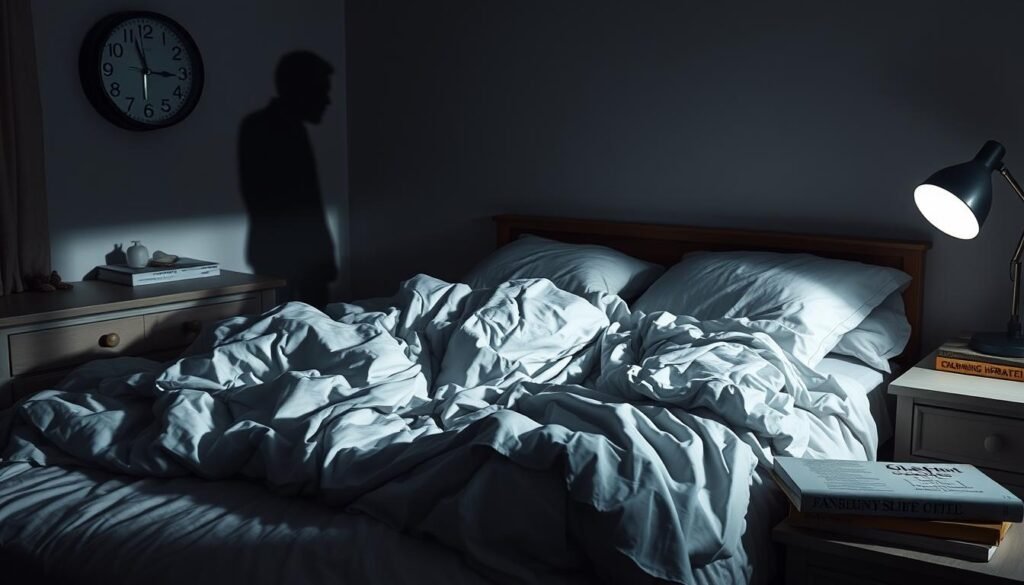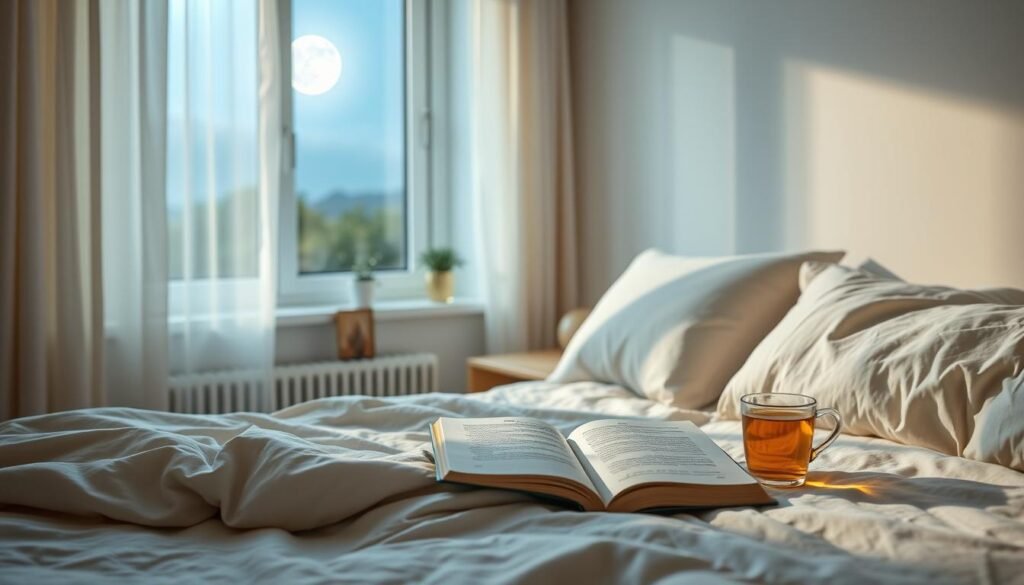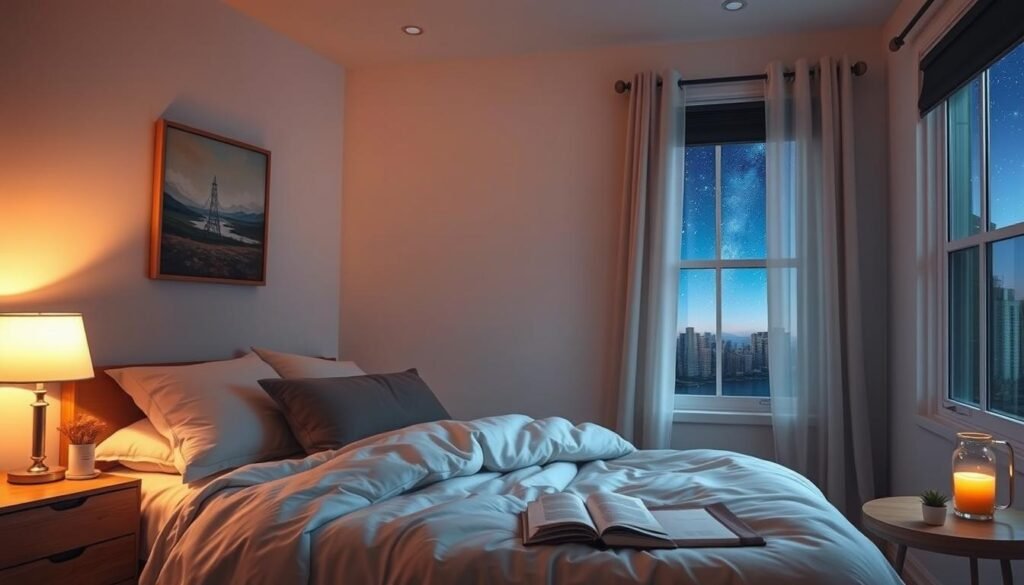Have you thought about the link between sleep and your mental health? For some, tackling sleep issues with depression seems tough. Yet, learning how sleep problems and mental health connect can show the way to better rest. Studies find that nearly 40% of those with insomnia also deal with depression. This makes it important to tackle these linked problems. Since depression can lead to troubles like insomnia and feeling overly sleepy, improving sleep hygiene becomes key to feeling emotionally well.
Making a bedtime routine and a restful sleeping space can really help. These steps can boost sleep quality and mental health. The bond between sleep and depression needs quick attention. Those who work on sleeping better often feel happier and think clearer. For more on this, research shows that good sleep habits help reduce depressive symptoms and improve how well people function.
Key Takeaways
- Improving sleep hygiene can significantly benefit those struggling with depression.
- Sleep quality is closely linked to mental health outcomes, making effective sleep practices essential.
- Up to 80% of individuals with depression may experience insomnia, highlighting the need for better sleep management.
- Create a sleep-conducive environment to enhance your nightly rest and improve mental health.
- Establishing a bedtime routine can positively influence sleep behaviors and emotional well-being.
- Regular exercise and healthy sleep habits are pivotal in managing insomnia and overall mood.
- Understanding the relationship between sleep disorders and depression can lead to effective treatment options.
The Connection Between Sleep and Depression
The link between sleep and depression is profound. Poor sleep can greatly increase the risk of depression. People with sleep disorders like insomnia are more prone to mental health issues.
About 75% of people with depression have sleep problems. This highlights a strong connection.
Insomnia can greatly increase the risk of depression, up to ten times. Around 80% of those with depression suffer from insomnia. About 15% may sleep too much. Not addressing both issues can make treatment less effective.
Identifying sleep problems early is important for effective help. It’s crucial to see a mental health professional or a sleep expert. They can help with both issues. For more information, check this resource. It explains sleep’s impact on depression.
Common Sleep Disorders Affecting People with Depression
Many people with depression also have sleep problems. Insomnia is a big problem for them, affecting about 88%. It makes it hard to fall asleep, stay asleep, or wake up too early. This lack of sleep can make daily life very tough.
Hypersomnia is also common, causing too much sleepiness during the day. It makes it hard for people to stay focused and productive. Their well-being takes a hit because of this. Hypersomnia and depression together make sleep issues more complicated.
About 20% of those with depression suffer from sleep apnea, mainly obstructive sleep apnea. It messes with their sleep in a way that stops restful sleep. Patients often feel more tired and their depression can get worse because of this.
Knowing about these sleep disorders is key to treating them. Fixing sleep issues like insomnia, hypersomnia, and sleep apnea can really help improve mental health. This is crucial for people fighting depression.

| Sleep Disorder | Impact on Depression | Prevalence in Depressive Patients |
|---|---|---|
| Insomnia | Leads to increased fatigue and worsened mood | Up to 88% |
| Hypersomnia | Causes daytime sleepiness and cognitive difficulties | Notably common among depressive individuals |
| Sleep Apnea | Interrupts restorative sleep, worsening depressive symptoms | Affects about 20% |
Understanding the Symptoms of Depression Impacting Sleep
Depression’s impact on sleep is significant. Many who are depressed have trouble sleeping. They can’t fall asleep or stay asleep well. Around 30% of people with depression suffer from insomnia. Emotional symptoms like deep sadness, irritability, and being very tired mess with sleep.
Doctors stress the need to get these symptoms of depression. They use this knowledge to help diagnose and treat patients. Cognitive Behavioral Therapy (CBT) works well for insomnia, with a 70% to 80% success rate. Bright light therapy helps those with seasonal depression, especially where winter days are short.
However, some antidepressants, like Selective Serotonin Reuptake Inhibitors (SSRIs), can cause insomnia. This shows why doctors must watch patients with sleep issues from depression carefully. Too long naps during the day, over 15-20 minutes, can make it hard to sleep at night. So, managing rest times is important.
To manage depression’s effects on sleep, good sleep habits are key. This includes setting a bedtime routine and making the sleep space better. Those having ongoing sleep problems because of mental health should see a healthcare provider or a sleep expert.
| Symptoms of Depression | Impact on Sleep |
|---|---|
| Pervasive sadness | Increases difficulty falling asleep |
| Irritability | May lead to restlessness |
| Lack of energy | Can exacerbate feelings of exhaustion |
| Difficulties concentrating | Impairs ability to relax before sleep |
Improving Sleep Hygiene with Depression
People with depression often find it hard to keep good sleep habits. Getting enough quality sleep is key in handling depression. A regular sleep schedule helps keep your body’s clock on track. This can make your sleep better. There are many ways to make a sleep-friendly space, especially if you can’t sleep well.
Establishing a Sleep Routine
Having a steady sleep schedule is crucial when dealing with depression. Going to bed and waking up at the same time every day helps your body know when to relax and be active. This can improve your sleep and make you feel better. Not sleeping enough can mess with your thinking, almost like being drunk. Important steps include:
- Setting a fixed bedtime and wake-up time daily.
- Limiting naps to no more than 30 minutes.
- Avoiding stimulants like caffeine and big meals before bed.
- Doing relaxation techniques like meditation before sleep.
Following these tips can ease insomnia symptoms and help your emotions stay even. If you’re looking for more help, check out effective strategies to improve your sleep.
Creating a Relaxing Sleep Environment
Making your sleeping area calm is also key to beating insomnia and feeling mentally better. A peaceful environment means you’ll sleep deeper and stay more balanced emotionally. Here’s how to make your bedroom more relaxing:
- Use blackout curtains to block out light.
- Keep the room at a comfy temperature.
- Use sound machines or earplugs to reduce noise.
- Get cozy bedding and pillows.
Activities that calm you before bed, like reading or deep breathing, can also improve sleep. Making these changes can greatly boost your mood and energy. This has a big positive effect on your mental health.

| Strategies for Improving Sleep Hygiene | Benefits |
|---|---|
| Consistent sleep routine | Helps regulate body rhythms, reducing insomnia symptoms |
| Relaxing sleep environments | Enhances sleep quality, aiding in emotional stability |
| Limit screen exposure | Promotes natural melatonin production for better sleep |
| Practice of relaxation techniques | Reduces stress and prepares the body for rest |
Focusing on these aspects can really improve your sleep habits and help you manage depression better. Aiming for a healthier sleep pattern and a calming environment can bring significant benefits to your overall health.
Treatment Options for Depression and Sleep Disorders
Treating depression and sleep issues requires a combined method. There’s a big link between sleep and mental health. This shows looking into effective treatment options for depression that help with sleep is key. Different strategies can boost overall health, like therapies and specific medicines for these problems.
Cognitive Behavioral Therapy for Insomnia (CBT-I)
Cognitive Behavioral Therapy (CBT) is a top treatment for both insomnia and depression. CBT-I, made for insomnia, aims to change sleep-disrupting thoughts and behaviors. It improves sleep habits and lessens depression signs. Research shows CBT-I can greatly boost sleep quality and length.
CBT-I often includes 6 to 8 sessions, tailored to each person’s progress. It addresses insomnia’s root issues, providing lasting benefits. This helps fight off future insomnia and depression, unlike sleep medicines that just cover up symptoms.
Antidepressants and Their Effects on Sleep
Antidepressants are key for treatment options for depression, but they affect sleep differently. Some, like SSRIs and SNRIs, may make sleep better. Yet, others can mess with sleep, so picking the right one with a doctor’s help is crucial.
Knowing the type of medication you take is important for sleep. There are several sleep drugs available, including:
| Type of Medication | Mechanism of Action | Impact on Sleep |
|---|---|---|
| Benzodiazepine receptor agonists | Enhance GABA activity | Promotes sedation |
| Non-benzodiazepine receptor agonists | Target specific receptors | Improves sleep onset |
| Melatonin receptor agonists | Mimic natural melatonin | Regulates sleep-wake cycle |
| Histamine receptor antagonists | Block histamine action | Induces drowsiness |
| Orexin receptor antagonists | Inhibit wakefulness | Facilitates sleep |
Talking to healthcare experts is key for a plan that balances antidepressants and sleep disorder management. A good evaluation helps get the best health results, improving sleep and easing depression symptoms.

The Role of Lifestyle Changes in Sleep Quality
Lifestyle tweaks can greatly improve how well you sleep, especially if you’re dealing with depression. Exercise and a good diet are particularly impactful. They support your mental well-being and help you rest better.
Exercise and Its Benefits for Sleep and Mental Health
Regular physical activity boosts sleep and fights depression. It helps manage your mood and gives you more energy. This leads to sleeping better at night. Also, it’s key to note that not sleeping well can make depression more likely. Making exercise a daily habit can combat depression symptoms and lead to healthier living.
Nutrition’s Impact on Sleep Hygiene
Nutrition plays a big role in how well you sleep. Eating foods that help you sleep can improve your overall health. Choosing the right foods ensures better sleep, crucial for mental health recovery. Combine this with regular exercise for the best results in improving sleep and mental health. For more details on how lifestyle changes affect sleep, check out this resource.
The Importance of Circadian Rhythms
Circadian rhythms are key in managing our sleep and mental well-being. These 24-hour cycles affect how alert or tired we feel. Knowing how they work can make sleep better, very important for those with depression.
How Light Exposure Affects Sleep Patterns
Light changes our circadian rhythms. We feel awake with daylight and ready for sleep as it gets dark. But too much artificial light at night can mess up these rhythms. This is a big problem for people with depression.The problem is worse in cities. Over 80% face too much light at night, hurting their sleep.
Managing light right does more than just help us sleep. Being in natural light during the day brings health perks:
- Enhances mood and fights depression.
- Improves cognitive function and memory.
- Regulates metabolism, lowering obesity risk.
- Supports hormone balance, crucial for health.
To better handle light exposure, you can:
- Get outside in sunlight during the day.
- Cut down on screen time at night to avoid blue light.
- Use blackout curtains for a darker sleeping environment.
Good circadian rhythms boost sleep and mental health. These practices align sleep patterns and promote physical health too.
| Benefits of Proper Light Exposure | Potential Risks of Light Pollution |
|---|---|
| Boosted mood and reduced depression | Worsened sleep disorders |
| Enhanced cognitive abilities | Increased risk of obesity and metabolic issues |
| Better hormonal balance | Impaired overall health |
| Improved sleep quality | Exacerbated symptoms of depression |
When to Seek Professional Help
Knowing when to ask for help is crucial if you are struggling with sleep issues or depression. Key signs include having trouble sleeping, feeling intense mood swings, and finding it hard to focus. Studies show that 90% of people with depression also have sleep problems. This highlights a strong link between mental health and how well you sleep.
People dealing with sleep problems should think about the long-term effects on their health. Not sleeping enough can harm your mental health. It can also lead to serious health issues like heart disease and diabetes. Plus, recent studies show that during the COVID-19 pandemic, many people felt more anxious and depressed. In fact, over half of Americans aged 35-44 reported they were not sleeping well.
A healthcare professional can give you a full check-up and suggest ways to treat your depression. One effective method is cognitive-behavioral therapy for insomnia (CBT-I). This focuses on changing the way you behave and think about sleep. Depending on what you need, treatment could include therapy, medication, or both.
- Persistent sleep issues hindering daily activities.
- Significant mood changes affecting relationships and responsibilities.
- Difficulty concentrating on tasks or completing them.
- Increased irritability or overall dissatisfaction with life.
Starting treatment early is key to avoiding long-term mental health issues. Prioritize your mental health and get help early. Doing so can make a big difference in your life quality and help you sleep better.
Conclusion
Improving sleep hygiene is key when dealing with depression. It helps with sleep quality and mental health. Sleep problems and mental health issues create a tough cycle to break. But understanding how they connect can help find better sleep and treatment strategies.
Setting a regular sleep schedule helps a lot. Doing calm activities like reading or mindfulness before bed is good too. Making the bedroom a comfortable, distraction-free zone is important for restful sleep. These steps can reduce anxiety and improve the quality of sleep.
It’s important to get professional help if sleep issues don’t improve. Chronic sleep problems can make mental health worse. But lifestyle changes and treatment can lead to better sleep and mental health. This helps individuals take back control of their lives and build resilience for the future.